【语法强练专讲】2015届中考语法知识名师手册: 第9讲 动词的时态和语态
文档属性
| 名称 | 【语法强练专讲】2015届中考语法知识名师手册: 第9讲 动词的时态和语态 |  | |
| 格式 | zip | ||
| 文件大小 | 154.2KB | ||
| 资源类型 | 教案 | ||
| 版本资源 | 外研版 | ||
| 科目 | 英语 | ||
| 更新时间 | 2014-08-04 16:16:20 | ||
图片预览

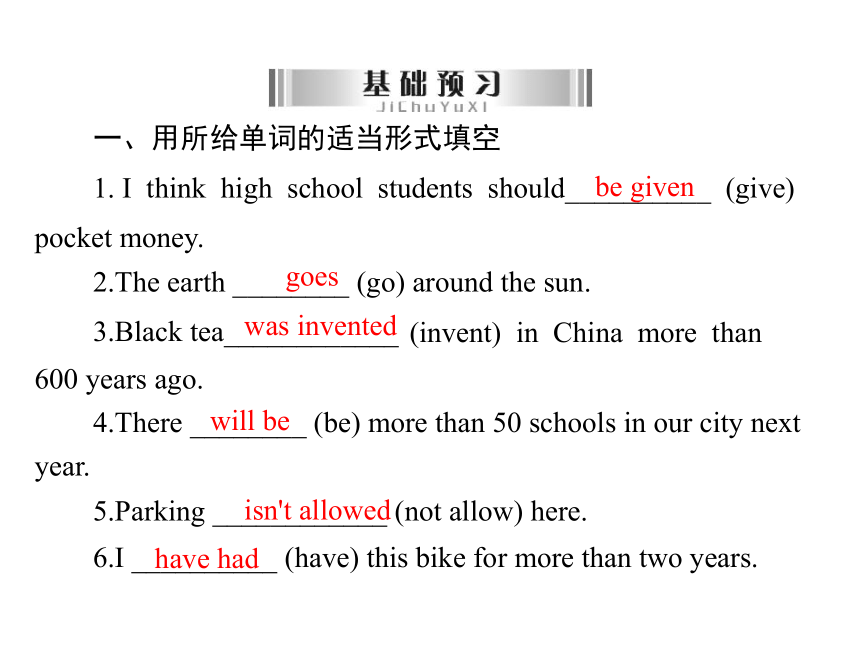
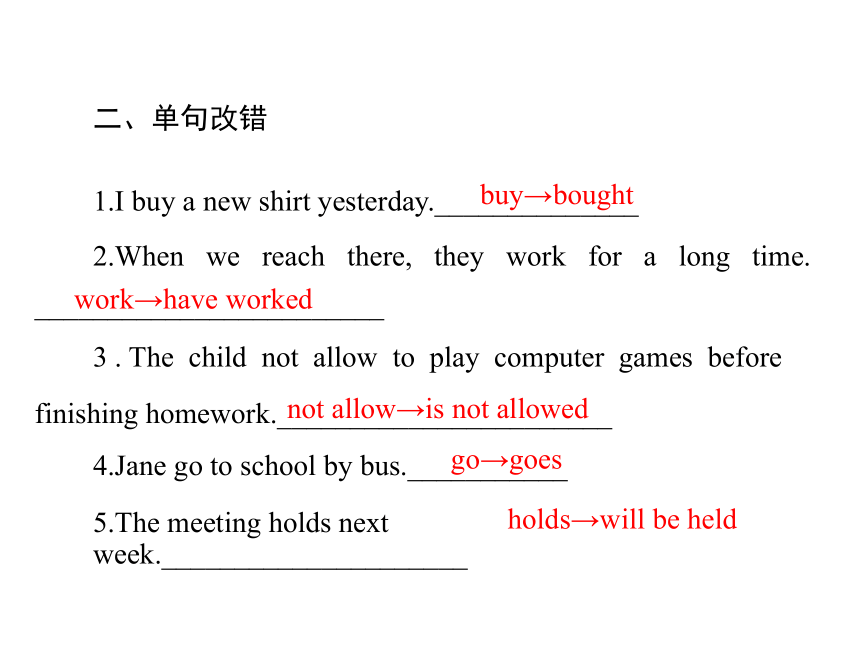
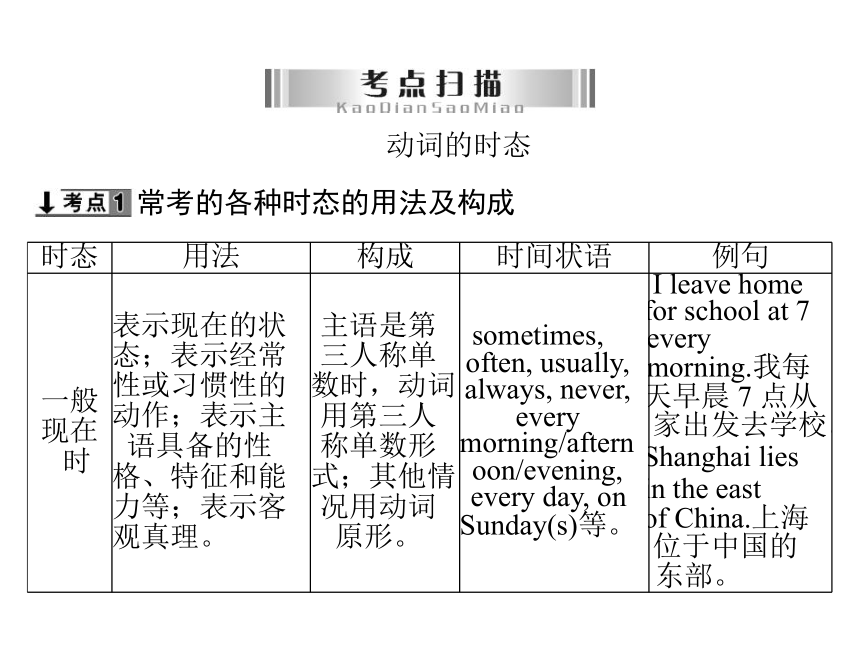
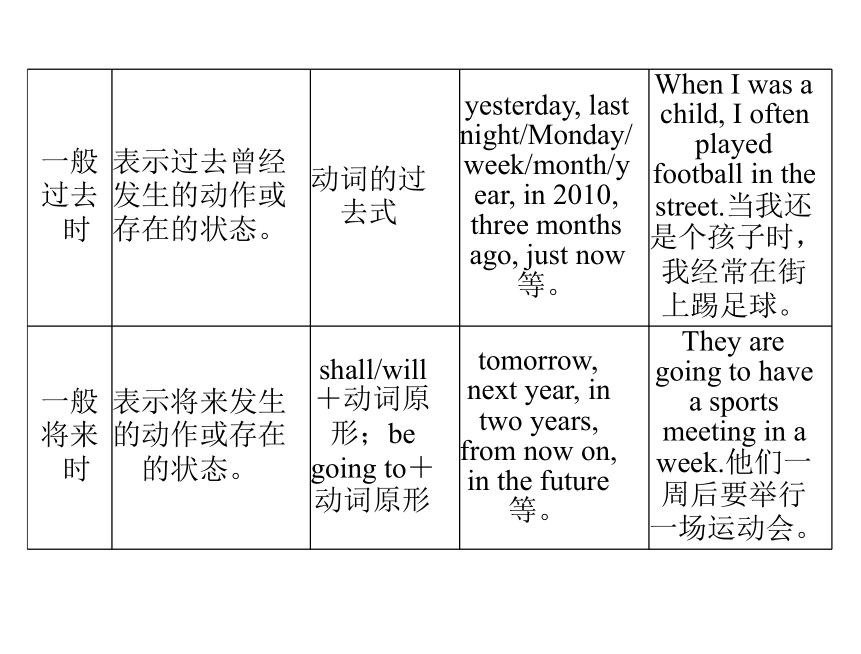
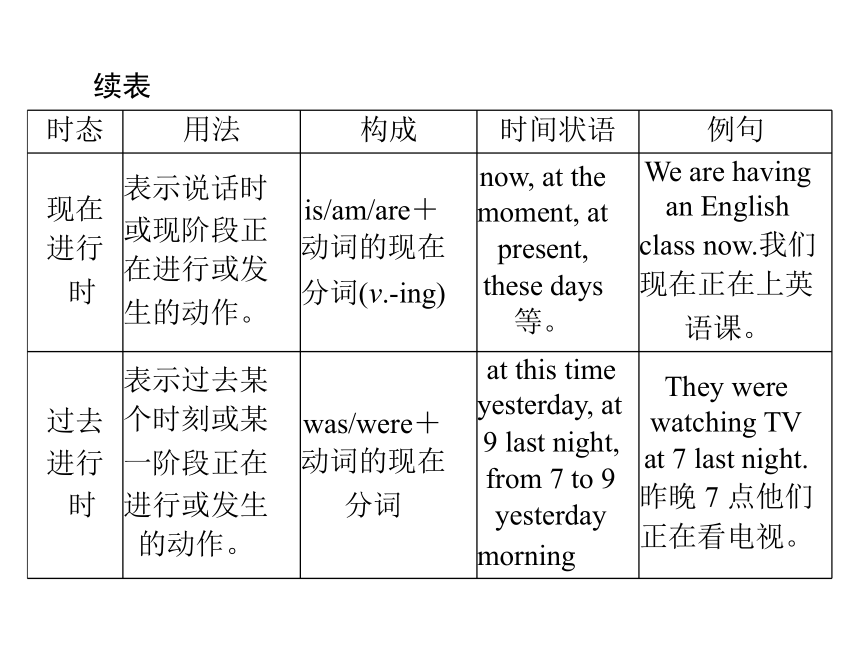
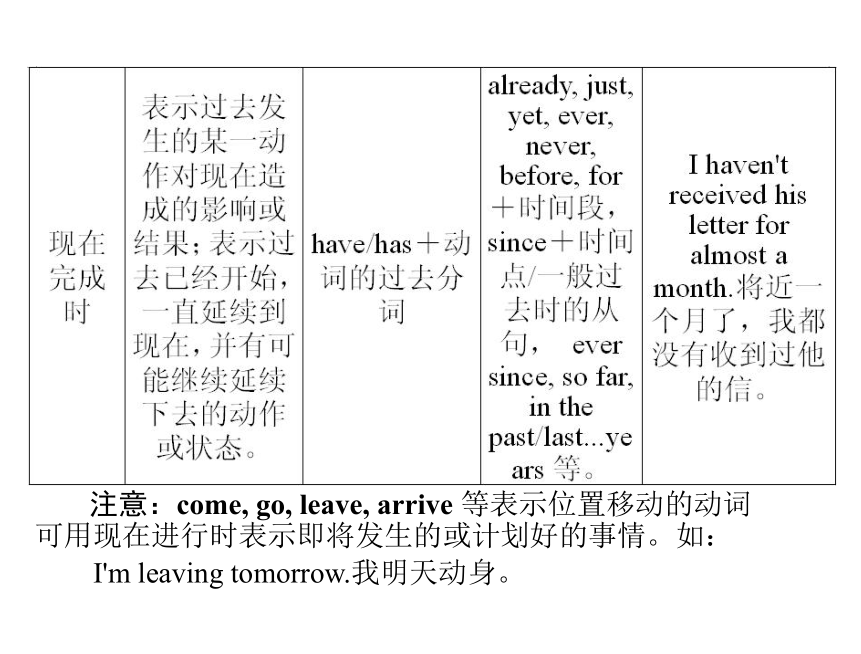

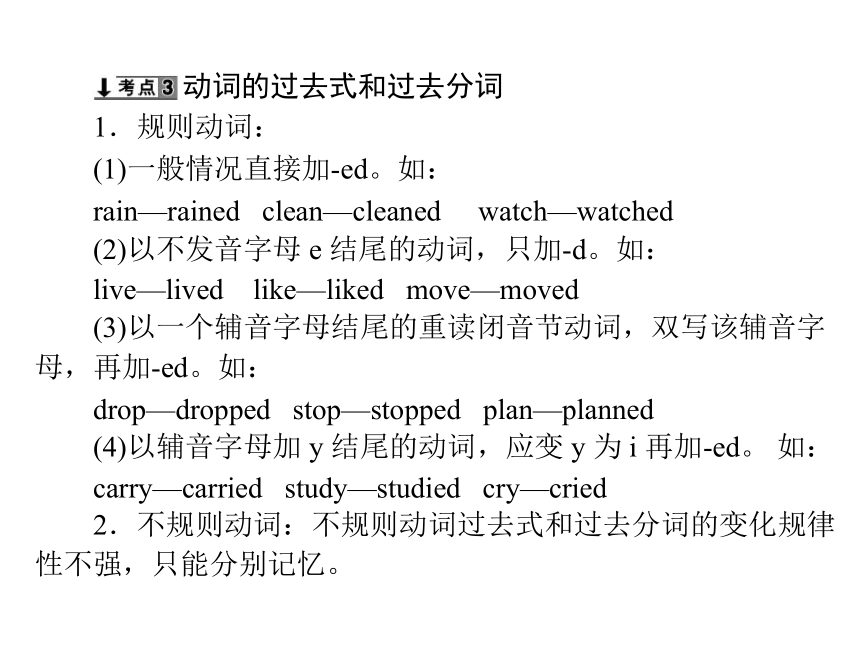
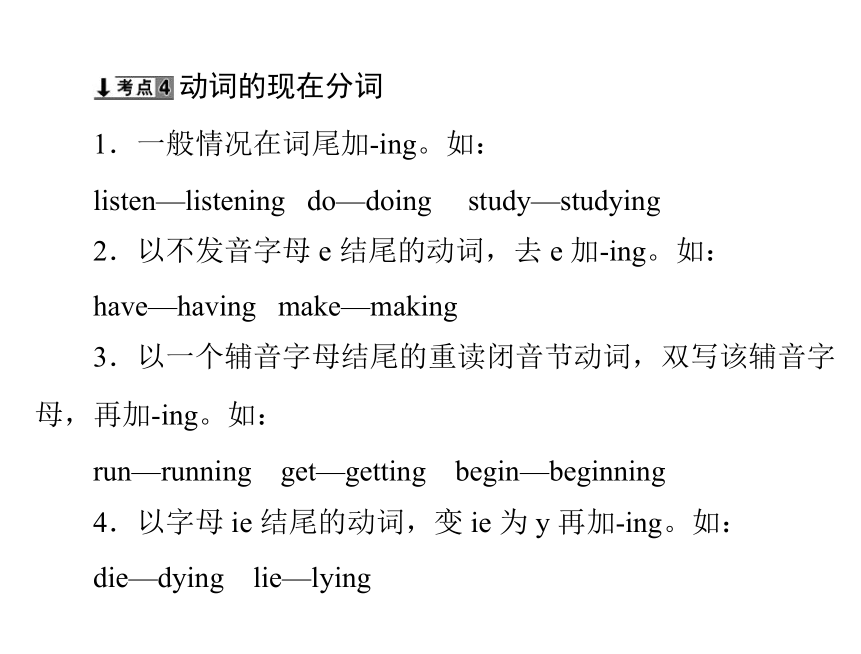
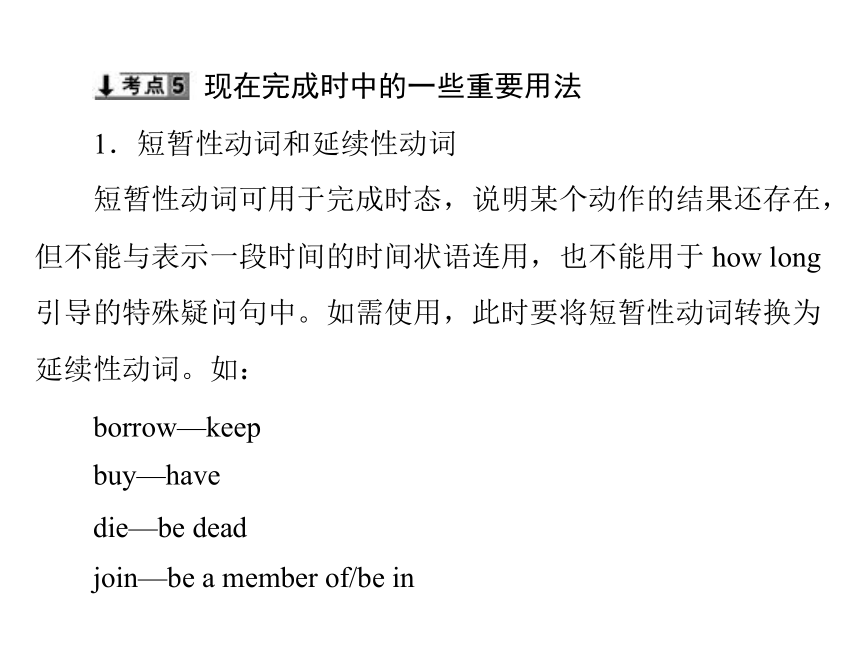
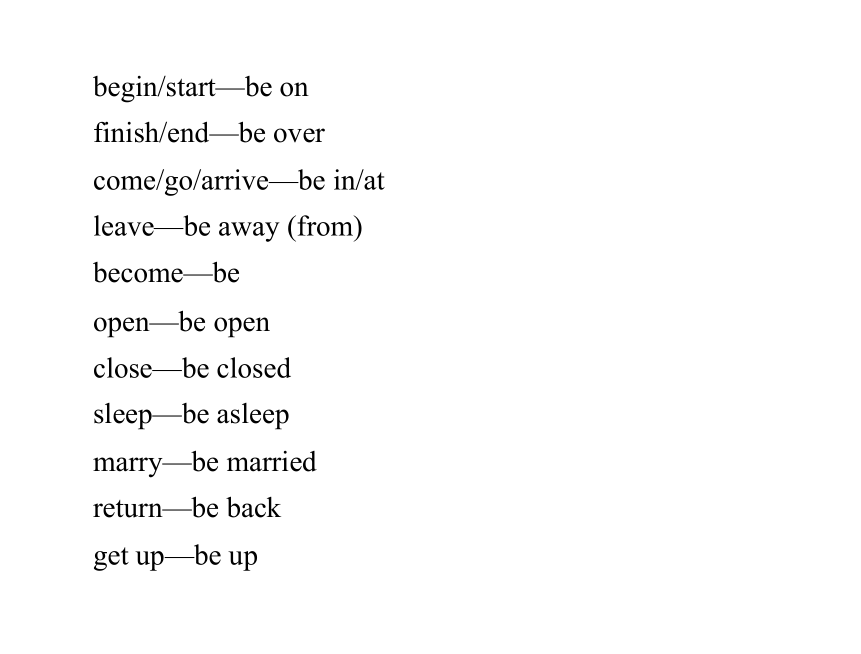
文档简介
课件54张PPT。第 9 讲动词的时态和语态一、用所给单词的适当形式填空
1. I think high school students should__________ (give)pocket money.be givengoes2.The earth ________ (go) around the sun.3.Black tea____________(invent) in China more than600 years ago.was inventedwill be4.There ________ (be) more than 50 schools in our city nextyear.isn't allowedhave had5.Parking ____________ (not allow) here.
6.I __________ (have) this bike for more than two years.
二、单句改错
not allow→is not allowed 1.I buy a new shirt yesterday.______________
2.When we reach there, they work for a long time.
________________________
3 . The child not allow to play computer games before
finishing homework._______________________4.Jane go to school by bus.___________go→goes5.The meeting holds next week._____________________
buy→bought
work→have worked
holds→will be held动词的时态常考的各种时态的用法及构成续表 注意:come, go, leave, arrive 等表示位置移动的动词
可用现在进行时表示即将发生的或计划好的事情。如:I'm leaving tomorrow.我明天动身。 动词的第三人称单数
1.一般情况直接加-s。如:stop—stopslook—looks read—reads2.以 s, x, ch, sh, o 结尾的动词加-es。如:watch—watchesmiss—misses
wash—washesfix—fixes
do—does3.以辅音字母加 y 结尾的动词,变 y 为 i 再加-es。如:
hurry—hurries cry—cries carry—carries
4.be 动词的三种形式:am, is, are
5.特殊:have—has 动词的过去式和过去分词
1.规则动词:
(1)一般情况直接加-ed。如:rain—rained clean—cleanedwatch—watched(2)以不发音字母 e 结尾的动词,只加-d。如:live—livedlike—liked move—moved (3)以一个辅音字母结尾的重读闭音节动词,双写该辅音字
母,再加-ed。如:
drop—dropped stop—stopped plan—planned
(4)以辅音字母加 y 结尾的动词,应变 y 为 i 再加-ed。 如:
carry—carried study—studied cry—cried
2.不规则动词:不规则动词过去式和过去分词的变化规律
性不强,只能分别记忆。 动词的现在分词
1.一般情况在词尾加-ing。如:listen—listening do—doingstudy—studying 2.以不发音字母 e 结尾的动词,去 e 加-ing。如:
have—having make—making
3.以一个辅音字母结尾的重读闭音节动词,双写该辅音字
母,再加-ing。如:run—runningget—gettingbegin—beginning4.以字母 ie 结尾的动词,变 ie 为 y 再加-ing。如:die—dyinglie—lying 现在完成时中的一些重要用法
1.短暂性动词和延续性动词 短暂性动词可用于完成时态,说明某个动作的结果还存在,
但不能与表示一段时间的时间状语连用,也不能用于 how long
引导的特殊疑问句中。如需使用,此时要将短暂性动词转换为
延续性动词。如:borrow—keep
buy—havedie—be deadjoin—be a member of/be inbegin/start—be on
finish/end—be overcome/go/arrive—be in/at
leave—be away (from)
become—beopen—be openclose—be closed
sleep—be asleepmarry—be married
return—be back
get up—be up2.have/has gone to, have/has been to 和 have/has been in 的区别(1)have/has gone to 强调“在去某地的路上或在某地”,人还未回来。如:Has he gone to Qingdao?他去青岛了吗?(2)have/has been to 强调“去过某地”,人已经回来了。如:Have you been to our town before?
你以前曾经去过我们镇吗?(3)have/has been in 强调“一直待在某地”,常与一段时间连用。如:He has been in Guangzhou since 1989.他自从 1989 年就待在广州了。3.现在完成时和一般过去时的区别 (1)现在完成时强调过去动作产生的结果对现在的影响,与
现在有关;一般过去时仅强调在过去某一时刻曾经发生的动作,
与现在无关。如:He has studied English for five years.他学英语五年了。(说明他现在还在学)He studied English for five years.他曾学过五年英语。(只说明他过去学过五年英语,但现在学不学就不知道了)(2)一般过去时常与具体的时间状语连用,而现在完成时常与模糊的时间状语连用,或无时间状语。被动语态 动词有两种语态:主动语态和被动语态。主动语态表示主
语是谓语动作的执行者;被动语态则表示主语是谓语动作的承
受者。中考考纲只要求考生掌握一般现在时、一般过去时、一
般将来时及含有情态动词的被动语态。被动语态的构成1.一般现在时的被动语态肯定句:主语+am/is/are+过去分词+其他否定句:主语+am/is/are+not+过去分词+其他
一般疑问句:Am/Is/Are+主语+过去分词+其他?2.一般过去时的被动语态肯定句:主语+was/were+过去分词+其他否定句:主语+was/were+not+过去分词+其他
一般疑问句:Was/Were+主语+过去分词+其他?
3.一般将来时的被动语态肯定句:主语+will/shall+be+过去分词+其他
否定句:主语+will/shall+not+be+过去分词+其他
一般疑问句:Will/Shall+主语+be+过去分词+其他?
4.一般现在时中含情态动词的被动语态肯定句:主语+情态动词+be+过去分词+其他
否定句:主语+情态动词+not+be+过去分词+其他
一般疑问句:情态动词+主语+be+过去分词+其他?被动语态的用法1.当不知道或没必要说明动作的执行者时,用被动语态。如:He was seen to go to the church.
他被看到去了教堂。This bridge was founded in 1981.这座桥于 1981 年竣工。 2.需强调或突出动作的承受者时常用被动语态。此时动作
的执行者由 by 引导且置于谓语动词之后,也可省略。如:She is liked by everyone.她被每个人所喜爱。The novel was translated, read and filmed by people.
这部小说被人们翻译、阅读并拍成电影。3.当动作的执行者不是人时,多用被动语态。如:The whole village has been washed away by the flood.整个村庄都被洪水冲走了。The window was blown open by wind.
窗户被风吹开了。4.表示客观的说明常用“It is+过去分词+that 从句”句型。这类句型有:It is said that...据说……It is known to all that...众所周知……
It is reported that...据报道……
It is believed that...大家相信……5.为了使句子简练,上下文紧凑、连贯,常使用被动语态。如:Apples are good for health and are liked by almost everyone.苹果对健康有益,几乎所有人都喜欢。When he was five, he was taught how to swim.
五岁的时候,他就被教会如何游泳。6.文章的标题、广告、新闻等用语也常使用被动语态。如:
Teachers Wanted.招聘老师。(省略 are)
Road Blocked.道路堵塞。(省略 is)注意:不及物动词( 短语 )happen/take place, appear,disappear, come true, come out 等无被动语态。主动语态表示被动意义1 .系动词 look, sound, smell, taste, seem, turn, get, become等的主动结构表示被动意义(系动词无被动式)。如:The idea sounds great.这主意听起来不错。The flowers look beautiful.这些花看起来很漂亮。2.动词不定式作定语时常用主动形式表示被动意义。如:I have a lot of homework to do every day.
我每天都有很多作业要做。She has a letter to write.她有一封信要写。3.need doing (=need to be done)用主动形式表示被动意义。如:This shirt needs washing.=This shirt needs to be washed.
这衬衫需要清洗了。()1.(2013 年广东)Hot water________ in the students'flats from 5 p.m.to 7 p.m.now. A.supplies
C.suppliedB.is supplied
D.was supplied B water 与 supply 之间是动宾关系,故排除 A、C 两项;
且由 now 可知描述的是一般情况,故选 B。()2.(2014 年广东)Our English teacher is very nice.We________ friends since three years ago.A.were
C.have beenB.became
D.have made C 由 since (自从)可以判断该句用现在完成时。become,
make 是短暂性动词,不能和表示延续的时间连用;单独的 be
动词不能表达动词的连续性。故选 C。()3.(2014 年广东)Jenny ________ in the kitchen whenyou called her at 5 o'clock this afternoon.
A.is cooking
B.was cooking
C.cooks
D.Cooked
B 题意:当你今天下午 5 点打电话给 Jenny 时,她正在厨
房里做饭。表示过去某一时间点正在进行的动作用过去进行时。()4.(2012 年广东广州)—I've got the final Harry Potterbook.
—You will love it.I ________ it twice already.
A.am reading
B.have read
C.was reading
D.will read
B 题意:“我买到最后一部《哈里·波特》了。”“你会
喜欢的,我已经看了两遍了。”根据 already 可知应用现在完成
时。()5.(2012 年广东佛山)The cleaners ________ the streetand it is quite clean now.
A.are sweeping
B.will sweep
C.have sweptC题意:清洁工人已经扫过这条街,现在它很干净。根据题意,动作应发生在过去且对现在造成了某种影响,故应用
现在完成时。()6.(2013 年广东佛山)Yang Liwei, a famous astronaut________ to Foshan in March, 2012.A.comesB.cameC.was comingB 根据时间状语可知动作发生在过去,故用一般过去时。()7.(2014 年广东佛山)Air must ________ fresh all thetime.It's good for our health.A.keepB.is keptC.be keptCmust 必须,是情态动词,故后面跟动词原形;空气是“被保持干净”,故选 C。()8.(2014 年广东河源)—Heyuan develops so fast. —That's true.Great changes ________ in Heyuan in the last
few years.
A.have been taken place
B.took place
C.take place
D.have taken place
D in the last few years 在过去的几年里,是现在完成时的
标志词;take place 发生,无被动语态。故选 D。()9.(2013 年广东河源)In the old days, they ________ inthe factory from morning to night.
A.were made to work
B.asked to work
C.made to work
D.were asked for work
A 题意:在过去,他们被迫从早到晚在工厂工作。他们
是“被迫”,故用被动语态;ask for 要求,请求。故选 A。()10.(2013 年广东梅州)—Where is your father? —He ________ Australia and he ________ Sydney for two
weeks.A.has been to; has been in
C.has been in; has been toB.has gone to; has been in
D.has gone to; has been to B 题意:“你的父亲在哪里?”“他去了澳大利亚,并
且已经在悉尼待了两周了。”have been to 表示过去曾经去过某
地,说话时已经从该地回来了;have gone to 表示在去某地的路
上或在某地,说话时还未回来;have been in 表示已在某地待了
多久。故选 B。()11.(2014 年广东茂名)This is No.9 Middle School.Itsdoor ________every day after school.
A.was closed
B.is closed
C.closeB题意:这是第 9 中学,每天下午放学后它的门都是关着的。be closed 关着的,表示状态;因为是每天都发生,故应
该用一般现在时。选 B。()12.(2014 年广东茂名)—Have you seen Mike?—He ________ football on the sports field.
A.plays
B.is playing
C.will playB题意:“你看见麦克了吗?”“他正在运动场踢足球。”表示动作正在进行,应用现在进行时。()13.(2014年广东深圳)—It's said a pianist will performat Poly Theater on Friday evening.Is it Lang Lang?
—Yes, it ________ him.He ________ for a week.A.must be; has arrived here
C.must be; has been hereB.maybe; has been here
D.maybe; has arrived here C 题意:“据说一个钢琴家周五晚上将要在保利剧院表
演。是郎朗吗?”“是的,一定是他。他已经到这儿一个星期
了。”根据题意可知是表示有把握的肯定推测,故应用 must be;
又 arrive 为短暂性动词,与一段时间连用时应改为 has been。故
选 C。()14.(2012 年广东深圳)—What will you do ________the summer holiday?
—I think I shall watch London Olympic
Games.It will ________ in August.A.during; be held
C.during; holdB.at; hold
D.at; be holdA表示“在一段时间内”用 during ;奥运会是“被举行”,应用被动语态。故选 A。()15.(2012 年广东湛江)—________ you ________ yourhomework?
—Not yet.A.Do; finish
C.Did; finishB.Have; finished
D.Are; finishedB 答语中有 yet,是完成时的标志词,故选 B。()16.(2012 年广东肇庆)—Have all the students knownthat our class will visit Mountain Tai this afternoon?
—Yes.Every student ________ about it.A. toldB.was toldC.has told学生们得知这个消息是因为“被告知”,故应用被动 B
语态。()17.(2011 年广东)—Alan, it's late.Why not go to bed? —Jenny hasn't come back yet.I ________ for her.
A. waited
B.have waited
C.am waiting
D.was waiting
C 由题意可知是“正在等她”,且由“it's late”可知表示现
在,故用现在进行时。()18.(2011 年广东)People who drink wine ________ todrive after May Day.
A. don't allow
B.isn't allowed
C.mustn't allow
D.mustn't be allowed
D 题意:五一节之后喝了酒的人不(被)允许开车。由题意
可知应用被动语态,B 项主谓不一致,故选 D。()19.(2013 年广东)Our math teacher ________ in ourschool for 20 years and he ________ here when he was 23 years
old.A.has taught; has come
C.taught; cameB.taught; comes
D.has taught; came D 题意:我们数学老师在我们学校教书 20 年了,当他 23
岁的时候他就来到了这里。由 for 20 years 可知,动作从 20 年
前持续到现在,故第一空要用现在完成时;由时间状语从句
“when he was 23 years old”可知,动作发生在 23 岁时,故第二
空要用一般过去时。()20.(2014 年广东广州)Yesterday evening, I ________along the street when I suddenly met my maths teacher.
A.walk
B.walked
C.was walking
D.am walkingC题意:昨天晚上我正沿着街道散步,突然遇到我的数学老师。“散步”这个动作是遇到老师时正在进行的,故用过
去进行时。()21.(2014 年广东佛山)The Chinese Culture Day________ in New York City on April 20th, 2011.
A.celebrated
B.is celebrated
C.was celebratedC“on April 20th, 2011” 表示的是过去时间,celebrate 与the Chinese Culture Day 是动宾关系,故用一般过去时的被动语
态。()22.(2014 年广东佛山)Most of the sandstorms in ourcountry ________ in spring, from March to May.A.happenB.HappensC.is happeningA由时间状语“in spring, from March to May”可知时态是一般现在时,且主语为复数,故选 A。()23.(2013年广东佛山)The Guangzhou Tower ________thousands of tourists since it was open to the public.A.attractsB.AttractedC.has attractedC由时间状语“since it was open to the public”可知应用现在完成时。()24.(2013 年广东深圳)—When should I hand in mypaper?
—Your paper must ________ as soon as the bell ________.
A.hand in; rings
B.hand in; will ring
C.be handed in; will ring
D.be handed in; rings
D hand in 与 paper 之间是动宾关系,故第一空用被动语
态;as soon as 引导的时间状语从句中,从句用一般现在时表示
将来。故选 D。()25.(2014 年广东梅州)The boss made him work 14hours a day.That means, he ________ work 14 hours a day. A. was made
C.was making B.made
D.was made toD由前一句可知“他被迫每天工作 14 个小时”,且前一句的谓语动词 made 是一般过去时,故用一般过去时的被动
语态。make sb.do sth.的被动语态要加上省略的 to,即 be made to
do sth.。故选 D。( )26.(2014 年广东肇庆)—Your classroom is very clean.
—Yes, it ________ every day.
A.is cleaned
B.cleans
C.is cleaningA由时间状语 every day 可知要用一般现在时,且 it(即your classroom)是 clean 这一动作的承受者,故用一般现在时的
被动语态,选 A。()27.(2014 年广东肇庆)You are too late.The film________ since half an hour ago.
A.has begun
B.has been on
C.began
B 由时间状语 since half an hour ago 可知用现在完成时,
且 begin 为短暂性动词,不能与一段时间连用,故用 be on。选
B。()28.(2013 年广东清远)Echo ________ for half amonth.She'll come back in two months.
A.left
B.leave
C.has left
D.has been awayD时间状语 for half a month 为一段时间,故谓语动词要用延续性动词;且由后一句“她将两个月后回来”说明已经离
开,应用现在完成时态。故选 D。()29.(2013 年广东)Robert with his two kids ________ tothe beach for vacation every year.
A.go
B.goes
C.went
D.are going
B 由时间状语 every year 可知用一般现在时;主语中带有
with 短语时,谓语动词应与 with 短语前面的主语保持一致。故
选 B。( )30.(2014 年广东)—Do you know her well?
—Sure.We ________ friends since ten years ago. A.were
C.have beenB.have made
D.have becomeC根据后面的 since ten years ago 可知用现在完成时,且make 和 become 均为短暂性动词,不能与一段时间连用,故用
have been。()31.(2013 年广东)The 16th Asian Games ________ inGuangzhou in November, 2010.
A.holds
B.will hold
C.was held
D.will be held
D 由时间状语“in November, 2010”可知要用将来时态,且
Asian Games 是 hold 这一动作的承受者,故用一般将来时的被
动语态。)32.(2013 年广东深圳)—Have you ever ________ (
Australia?—Yes,I have.It'sreally interesting ________withkangaroos.A. been to; to play
C.been to; playB.gone to; played
D.gone to; playingA题意:“你曾经去过澳大利亚吗?”“是的。跟袋鼠一起玩真的很有趣。”由题意可知表示“去过某地”,现在已
经回来了,故用 have been to;固定句型 it is+adj.+to do sth.意
为“做某事怎么样”。()33.(2013 年广东梅州)—May I speak to John? —Sorry, he ________ Japan.But he ________ in two days.
A.has been to; will come back
B.has gone to; will be back
C.has been in; would come back
D.has gone to; won't come back
B 由答语可知“去日本了还没回来”,故第一空要用 has
gone to;由时间状语 in two days 及题意可知第二空要用一般将
来时的肯定式。故选 B。()34.(2014 年广东肇庆)According to the library rules,books ________ for two weeks at most.A.can be borrowedB.can keepC.can be kept C borrow 是短暂性动词,不能与 for two weeks 连用,故
要用延续性动词 keep; keep 与 books 是动宾关系,故用被动语
态。选 C。( )35.(2013年广东广州)—Excuse me, what's this for?
—It's a cleaner and it ________ to pick up dirt. A.uses
C.is using B.is used
D.UsedB use 与 it (指 cleaner)之间是动宾关系,故用被动语态。()36.(2013 年广东湛江)—I heard that Mr.Brown diedlast year.
—Yes, he has ________ for a year, but we still miss him.
A.been dead
B.death
C.died
D.dying
A 由 for a year 可知要用延续性动词,故用 been dead; death
为名词,dying 为现在分词,均不符合。()37.(2014 年广东佛山)I ________ my work today.Let'sgo for a coffee.A.finishB.will finishC.have finishedC由后一句“我们去喝杯咖啡吧”可知“我已经完成了工作”,故用现在完成时。()38.(2014 年广东佛山)Experts ________ to makesuggestions to help the city develop.A.will inviteB.are invitedC.have invitedB invite 与 experts 之间是动宾关系,故用被动语态。
1. I think high school students should__________ (give)pocket money.be givengoes2.The earth ________ (go) around the sun.3.Black tea____________(invent) in China more than600 years ago.was inventedwill be4.There ________ (be) more than 50 schools in our city nextyear.isn't allowedhave had5.Parking ____________ (not allow) here.
6.I __________ (have) this bike for more than two years.
二、单句改错
not allow→is not allowed 1.I buy a new shirt yesterday.______________
2.When we reach there, they work for a long time.
________________________
3 . The child not allow to play computer games before
finishing homework._______________________4.Jane go to school by bus.___________go→goes5.The meeting holds next week._____________________
buy→bought
work→have worked
holds→will be held动词的时态常考的各种时态的用法及构成续表 注意:come, go, leave, arrive 等表示位置移动的动词
可用现在进行时表示即将发生的或计划好的事情。如:I'm leaving tomorrow.我明天动身。 动词的第三人称单数
1.一般情况直接加-s。如:stop—stopslook—looks read—reads2.以 s, x, ch, sh, o 结尾的动词加-es。如:watch—watchesmiss—misses
wash—washesfix—fixes
do—does3.以辅音字母加 y 结尾的动词,变 y 为 i 再加-es。如:
hurry—hurries cry—cries carry—carries
4.be 动词的三种形式:am, is, are
5.特殊:have—has 动词的过去式和过去分词
1.规则动词:
(1)一般情况直接加-ed。如:rain—rained clean—cleanedwatch—watched(2)以不发音字母 e 结尾的动词,只加-d。如:live—livedlike—liked move—moved (3)以一个辅音字母结尾的重读闭音节动词,双写该辅音字
母,再加-ed。如:
drop—dropped stop—stopped plan—planned
(4)以辅音字母加 y 结尾的动词,应变 y 为 i 再加-ed。 如:
carry—carried study—studied cry—cried
2.不规则动词:不规则动词过去式和过去分词的变化规律
性不强,只能分别记忆。 动词的现在分词
1.一般情况在词尾加-ing。如:listen—listening do—doingstudy—studying 2.以不发音字母 e 结尾的动词,去 e 加-ing。如:
have—having make—making
3.以一个辅音字母结尾的重读闭音节动词,双写该辅音字
母,再加-ing。如:run—runningget—gettingbegin—beginning4.以字母 ie 结尾的动词,变 ie 为 y 再加-ing。如:die—dyinglie—lying 现在完成时中的一些重要用法
1.短暂性动词和延续性动词 短暂性动词可用于完成时态,说明某个动作的结果还存在,
但不能与表示一段时间的时间状语连用,也不能用于 how long
引导的特殊疑问句中。如需使用,此时要将短暂性动词转换为
延续性动词。如:borrow—keep
buy—havedie—be deadjoin—be a member of/be inbegin/start—be on
finish/end—be overcome/go/arrive—be in/at
leave—be away (from)
become—beopen—be openclose—be closed
sleep—be asleepmarry—be married
return—be back
get up—be up2.have/has gone to, have/has been to 和 have/has been in 的区别(1)have/has gone to 强调“在去某地的路上或在某地”,人还未回来。如:Has he gone to Qingdao?他去青岛了吗?(2)have/has been to 强调“去过某地”,人已经回来了。如:Have you been to our town before?
你以前曾经去过我们镇吗?(3)have/has been in 强调“一直待在某地”,常与一段时间连用。如:He has been in Guangzhou since 1989.他自从 1989 年就待在广州了。3.现在完成时和一般过去时的区别 (1)现在完成时强调过去动作产生的结果对现在的影响,与
现在有关;一般过去时仅强调在过去某一时刻曾经发生的动作,
与现在无关。如:He has studied English for five years.他学英语五年了。(说明他现在还在学)He studied English for five years.他曾学过五年英语。(只说明他过去学过五年英语,但现在学不学就不知道了)(2)一般过去时常与具体的时间状语连用,而现在完成时常与模糊的时间状语连用,或无时间状语。被动语态 动词有两种语态:主动语态和被动语态。主动语态表示主
语是谓语动作的执行者;被动语态则表示主语是谓语动作的承
受者。中考考纲只要求考生掌握一般现在时、一般过去时、一
般将来时及含有情态动词的被动语态。被动语态的构成1.一般现在时的被动语态肯定句:主语+am/is/are+过去分词+其他否定句:主语+am/is/are+not+过去分词+其他
一般疑问句:Am/Is/Are+主语+过去分词+其他?2.一般过去时的被动语态肯定句:主语+was/were+过去分词+其他否定句:主语+was/were+not+过去分词+其他
一般疑问句:Was/Were+主语+过去分词+其他?
3.一般将来时的被动语态肯定句:主语+will/shall+be+过去分词+其他
否定句:主语+will/shall+not+be+过去分词+其他
一般疑问句:Will/Shall+主语+be+过去分词+其他?
4.一般现在时中含情态动词的被动语态肯定句:主语+情态动词+be+过去分词+其他
否定句:主语+情态动词+not+be+过去分词+其他
一般疑问句:情态动词+主语+be+过去分词+其他?被动语态的用法1.当不知道或没必要说明动作的执行者时,用被动语态。如:He was seen to go to the church.
他被看到去了教堂。This bridge was founded in 1981.这座桥于 1981 年竣工。 2.需强调或突出动作的承受者时常用被动语态。此时动作
的执行者由 by 引导且置于谓语动词之后,也可省略。如:She is liked by everyone.她被每个人所喜爱。The novel was translated, read and filmed by people.
这部小说被人们翻译、阅读并拍成电影。3.当动作的执行者不是人时,多用被动语态。如:The whole village has been washed away by the flood.整个村庄都被洪水冲走了。The window was blown open by wind.
窗户被风吹开了。4.表示客观的说明常用“It is+过去分词+that 从句”句型。这类句型有:It is said that...据说……It is known to all that...众所周知……
It is reported that...据报道……
It is believed that...大家相信……5.为了使句子简练,上下文紧凑、连贯,常使用被动语态。如:Apples are good for health and are liked by almost everyone.苹果对健康有益,几乎所有人都喜欢。When he was five, he was taught how to swim.
五岁的时候,他就被教会如何游泳。6.文章的标题、广告、新闻等用语也常使用被动语态。如:
Teachers Wanted.招聘老师。(省略 are)
Road Blocked.道路堵塞。(省略 is)注意:不及物动词( 短语 )happen/take place, appear,disappear, come true, come out 等无被动语态。主动语态表示被动意义1 .系动词 look, sound, smell, taste, seem, turn, get, become等的主动结构表示被动意义(系动词无被动式)。如:The idea sounds great.这主意听起来不错。The flowers look beautiful.这些花看起来很漂亮。2.动词不定式作定语时常用主动形式表示被动意义。如:I have a lot of homework to do every day.
我每天都有很多作业要做。She has a letter to write.她有一封信要写。3.need doing (=need to be done)用主动形式表示被动意义。如:This shirt needs washing.=This shirt needs to be washed.
这衬衫需要清洗了。()1.(2013 年广东)Hot water________ in the students'flats from 5 p.m.to 7 p.m.now. A.supplies
C.suppliedB.is supplied
D.was supplied B water 与 supply 之间是动宾关系,故排除 A、C 两项;
且由 now 可知描述的是一般情况,故选 B。()2.(2014 年广东)Our English teacher is very nice.We________ friends since three years ago.A.were
C.have beenB.became
D.have made C 由 since (自从)可以判断该句用现在完成时。become,
make 是短暂性动词,不能和表示延续的时间连用;单独的 be
动词不能表达动词的连续性。故选 C。()3.(2014 年广东)Jenny ________ in the kitchen whenyou called her at 5 o'clock this afternoon.
A.is cooking
B.was cooking
C.cooks
D.Cooked
B 题意:当你今天下午 5 点打电话给 Jenny 时,她正在厨
房里做饭。表示过去某一时间点正在进行的动作用过去进行时。()4.(2012 年广东广州)—I've got the final Harry Potterbook.
—You will love it.I ________ it twice already.
A.am reading
B.have read
C.was reading
D.will read
B 题意:“我买到最后一部《哈里·波特》了。”“你会
喜欢的,我已经看了两遍了。”根据 already 可知应用现在完成
时。()5.(2012 年广东佛山)The cleaners ________ the streetand it is quite clean now.
A.are sweeping
B.will sweep
C.have sweptC题意:清洁工人已经扫过这条街,现在它很干净。根据题意,动作应发生在过去且对现在造成了某种影响,故应用
现在完成时。()6.(2013 年广东佛山)Yang Liwei, a famous astronaut________ to Foshan in March, 2012.A.comesB.cameC.was comingB 根据时间状语可知动作发生在过去,故用一般过去时。()7.(2014 年广东佛山)Air must ________ fresh all thetime.It's good for our health.A.keepB.is keptC.be keptCmust 必须,是情态动词,故后面跟动词原形;空气是“被保持干净”,故选 C。()8.(2014 年广东河源)—Heyuan develops so fast. —That's true.Great changes ________ in Heyuan in the last
few years.
A.have been taken place
B.took place
C.take place
D.have taken place
D in the last few years 在过去的几年里,是现在完成时的
标志词;take place 发生,无被动语态。故选 D。()9.(2013 年广东河源)In the old days, they ________ inthe factory from morning to night.
A.were made to work
B.asked to work
C.made to work
D.were asked for work
A 题意:在过去,他们被迫从早到晚在工厂工作。他们
是“被迫”,故用被动语态;ask for 要求,请求。故选 A。()10.(2013 年广东梅州)—Where is your father? —He ________ Australia and he ________ Sydney for two
weeks.A.has been to; has been in
C.has been in; has been toB.has gone to; has been in
D.has gone to; has been to B 题意:“你的父亲在哪里?”“他去了澳大利亚,并
且已经在悉尼待了两周了。”have been to 表示过去曾经去过某
地,说话时已经从该地回来了;have gone to 表示在去某地的路
上或在某地,说话时还未回来;have been in 表示已在某地待了
多久。故选 B。()11.(2014 年广东茂名)This is No.9 Middle School.Itsdoor ________every day after school.
A.was closed
B.is closed
C.closeB题意:这是第 9 中学,每天下午放学后它的门都是关着的。be closed 关着的,表示状态;因为是每天都发生,故应
该用一般现在时。选 B。()12.(2014 年广东茂名)—Have you seen Mike?—He ________ football on the sports field.
A.plays
B.is playing
C.will playB题意:“你看见麦克了吗?”“他正在运动场踢足球。”表示动作正在进行,应用现在进行时。()13.(2014年广东深圳)—It's said a pianist will performat Poly Theater on Friday evening.Is it Lang Lang?
—Yes, it ________ him.He ________ for a week.A.must be; has arrived here
C.must be; has been hereB.maybe; has been here
D.maybe; has arrived here C 题意:“据说一个钢琴家周五晚上将要在保利剧院表
演。是郎朗吗?”“是的,一定是他。他已经到这儿一个星期
了。”根据题意可知是表示有把握的肯定推测,故应用 must be;
又 arrive 为短暂性动词,与一段时间连用时应改为 has been。故
选 C。()14.(2012 年广东深圳)—What will you do ________the summer holiday?
—I think I shall watch London Olympic
Games.It will ________ in August.A.during; be held
C.during; holdB.at; hold
D.at; be holdA表示“在一段时间内”用 during ;奥运会是“被举行”,应用被动语态。故选 A。()15.(2012 年广东湛江)—________ you ________ yourhomework?
—Not yet.A.Do; finish
C.Did; finishB.Have; finished
D.Are; finishedB 答语中有 yet,是完成时的标志词,故选 B。()16.(2012 年广东肇庆)—Have all the students knownthat our class will visit Mountain Tai this afternoon?
—Yes.Every student ________ about it.A. toldB.was toldC.has told学生们得知这个消息是因为“被告知”,故应用被动 B
语态。()17.(2011 年广东)—Alan, it's late.Why not go to bed? —Jenny hasn't come back yet.I ________ for her.
A. waited
B.have waited
C.am waiting
D.was waiting
C 由题意可知是“正在等她”,且由“it's late”可知表示现
在,故用现在进行时。()18.(2011 年广东)People who drink wine ________ todrive after May Day.
A. don't allow
B.isn't allowed
C.mustn't allow
D.mustn't be allowed
D 题意:五一节之后喝了酒的人不(被)允许开车。由题意
可知应用被动语态,B 项主谓不一致,故选 D。()19.(2013 年广东)Our math teacher ________ in ourschool for 20 years and he ________ here when he was 23 years
old.A.has taught; has come
C.taught; cameB.taught; comes
D.has taught; came D 题意:我们数学老师在我们学校教书 20 年了,当他 23
岁的时候他就来到了这里。由 for 20 years 可知,动作从 20 年
前持续到现在,故第一空要用现在完成时;由时间状语从句
“when he was 23 years old”可知,动作发生在 23 岁时,故第二
空要用一般过去时。()20.(2014 年广东广州)Yesterday evening, I ________along the street when I suddenly met my maths teacher.
A.walk
B.walked
C.was walking
D.am walkingC题意:昨天晚上我正沿着街道散步,突然遇到我的数学老师。“散步”这个动作是遇到老师时正在进行的,故用过
去进行时。()21.(2014 年广东佛山)The Chinese Culture Day________ in New York City on April 20th, 2011.
A.celebrated
B.is celebrated
C.was celebratedC“on April 20th, 2011” 表示的是过去时间,celebrate 与the Chinese Culture Day 是动宾关系,故用一般过去时的被动语
态。()22.(2014 年广东佛山)Most of the sandstorms in ourcountry ________ in spring, from March to May.A.happenB.HappensC.is happeningA由时间状语“in spring, from March to May”可知时态是一般现在时,且主语为复数,故选 A。()23.(2013年广东佛山)The Guangzhou Tower ________thousands of tourists since it was open to the public.A.attractsB.AttractedC.has attractedC由时间状语“since it was open to the public”可知应用现在完成时。()24.(2013 年广东深圳)—When should I hand in mypaper?
—Your paper must ________ as soon as the bell ________.
A.hand in; rings
B.hand in; will ring
C.be handed in; will ring
D.be handed in; rings
D hand in 与 paper 之间是动宾关系,故第一空用被动语
态;as soon as 引导的时间状语从句中,从句用一般现在时表示
将来。故选 D。()25.(2014 年广东梅州)The boss made him work 14hours a day.That means, he ________ work 14 hours a day. A. was made
C.was making B.made
D.was made toD由前一句可知“他被迫每天工作 14 个小时”,且前一句的谓语动词 made 是一般过去时,故用一般过去时的被动
语态。make sb.do sth.的被动语态要加上省略的 to,即 be made to
do sth.。故选 D。( )26.(2014 年广东肇庆)—Your classroom is very clean.
—Yes, it ________ every day.
A.is cleaned
B.cleans
C.is cleaningA由时间状语 every day 可知要用一般现在时,且 it(即your classroom)是 clean 这一动作的承受者,故用一般现在时的
被动语态,选 A。()27.(2014 年广东肇庆)You are too late.The film________ since half an hour ago.
A.has begun
B.has been on
C.began
B 由时间状语 since half an hour ago 可知用现在完成时,
且 begin 为短暂性动词,不能与一段时间连用,故用 be on。选
B。()28.(2013 年广东清远)Echo ________ for half amonth.She'll come back in two months.
A.left
B.leave
C.has left
D.has been awayD时间状语 for half a month 为一段时间,故谓语动词要用延续性动词;且由后一句“她将两个月后回来”说明已经离
开,应用现在完成时态。故选 D。()29.(2013 年广东)Robert with his two kids ________ tothe beach for vacation every year.
A.go
B.goes
C.went
D.are going
B 由时间状语 every year 可知用一般现在时;主语中带有
with 短语时,谓语动词应与 with 短语前面的主语保持一致。故
选 B。( )30.(2014 年广东)—Do you know her well?
—Sure.We ________ friends since ten years ago. A.were
C.have beenB.have made
D.have becomeC根据后面的 since ten years ago 可知用现在完成时,且make 和 become 均为短暂性动词,不能与一段时间连用,故用
have been。()31.(2013 年广东)The 16th Asian Games ________ inGuangzhou in November, 2010.
A.holds
B.will hold
C.was held
D.will be held
D 由时间状语“in November, 2010”可知要用将来时态,且
Asian Games 是 hold 这一动作的承受者,故用一般将来时的被
动语态。)32.(2013 年广东深圳)—Have you ever ________ (
Australia?—Yes,I have.It'sreally interesting ________withkangaroos.A. been to; to play
C.been to; playB.gone to; played
D.gone to; playingA题意:“你曾经去过澳大利亚吗?”“是的。跟袋鼠一起玩真的很有趣。”由题意可知表示“去过某地”,现在已
经回来了,故用 have been to;固定句型 it is+adj.+to do sth.意
为“做某事怎么样”。()33.(2013 年广东梅州)—May I speak to John? —Sorry, he ________ Japan.But he ________ in two days.
A.has been to; will come back
B.has gone to; will be back
C.has been in; would come back
D.has gone to; won't come back
B 由答语可知“去日本了还没回来”,故第一空要用 has
gone to;由时间状语 in two days 及题意可知第二空要用一般将
来时的肯定式。故选 B。()34.(2014 年广东肇庆)According to the library rules,books ________ for two weeks at most.A.can be borrowedB.can keepC.can be kept C borrow 是短暂性动词,不能与 for two weeks 连用,故
要用延续性动词 keep; keep 与 books 是动宾关系,故用被动语
态。选 C。( )35.(2013年广东广州)—Excuse me, what's this for?
—It's a cleaner and it ________ to pick up dirt. A.uses
C.is using B.is used
D.UsedB use 与 it (指 cleaner)之间是动宾关系,故用被动语态。()36.(2013 年广东湛江)—I heard that Mr.Brown diedlast year.
—Yes, he has ________ for a year, but we still miss him.
A.been dead
B.death
C.died
D.dying
A 由 for a year 可知要用延续性动词,故用 been dead; death
为名词,dying 为现在分词,均不符合。()37.(2014 年广东佛山)I ________ my work today.Let'sgo for a coffee.A.finishB.will finishC.have finishedC由后一句“我们去喝杯咖啡吧”可知“我已经完成了工作”,故用现在完成时。()38.(2014 年广东佛山)Experts ________ to makesuggestions to help the city develop.A.will inviteB.are invitedC.have invitedB invite 与 experts 之间是动宾关系,故用被动语态。
同课章节目录
- 词法
- 名词
- 动词和动词短语
- 动词语态
- 动词时态
- 助动词和情态动词
- 非谓语动词
- 冠词
- 代词
- 数词和量词
- 形容词副词及其比较等级
- 介词和介词短语
- 连词和感叹词
- 构词法
- 相似、相近词比较
- 句法
- 陈述句
- 一般疑问句和否定疑问句
- 特殊疑问句及选择疑问句
- 反意疑问句
- 存在句(There be句型)
- 宾语从句
- 定语从句
- 状语从句
- 主谓一致问题
- 简单句
- 并列句
- 复合句
- 主谓一致
- 主、表语从句
- 名词性从句
- 直接引语和间接引语
- 虚拟语气
- 感叹句
- 强调句
- 倒装句
- 祈使句
- 句子的成分
- 句子的分类
- 题型专区
- 单项选择部分
- 易错题
- 完形填空
- 阅读理解
- 词汇练习
- 听说训练
- 句型转换
- 补全对话
- 短文改错
- 翻译
- 书面表达
- 任务型阅读
- 语法填空
- 其他资料
